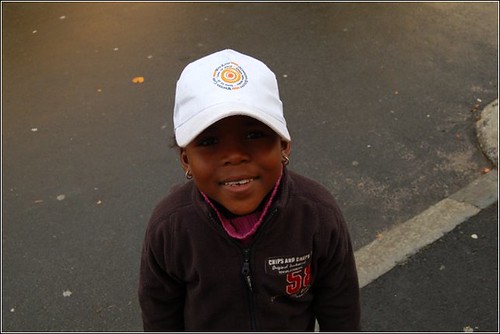Working Towards Agency-Building Practice
She’s five, maybe six years old, and her eyes are glued to my camera. After some hesitation, she comes up to me and says, “Can I see?” I kneel down on the wet concrete and show her the camera. I point to the viewfinder. She puts her small hand on mine and gingerly lowers the camera to her eye level. She looks through the viewfinder and smiles. She can see Sharon and the other children . Then, her eyes big and innocent and happy, she looks at me and says, “Do you have money?”
And then, back in the car, going back to the guesthouse in Cape Town where we’re staying for the duration of our project, I find myself overwhelmed by emotions. Today is my third day in Cape Town working with Teachers Without Borders Canada. Today is when it hits me: In the grand scheme of things, how much can we really do to help?
My thoughts take me back to some of the conversations that I’ve had with South African teachers this past week. The teachers who attended our Teachers Without Borders ICT Workshop here in Cape Town have been very enthusiastic about learning how to integrate technology into their lessons. They were the first to admit that the “chalk and talk” approach that is so common in their schools bores students. They told us that they want to differentiate instruction, to engage their students in learning. “I want my students to want to stay in my class,” one of them said to me at lunch.
The teachers who participated in our workshop were true lifelong learners. I was very impressed by their passion for learning. They embraced Moodle, they embraced blogging, and their questions and comments made it clear that they see technology integration as a complex, but rewarding task. They want to invest in themselves so that they can improve the learning experiences for their students. When Sharon showed them the four XOs that she was lucky enough to have donated to this project by various institutions and individuals in Canada, the whole room started buzzing . They all wanted to see them. They all wanted to test them. When we took out our Flip cameras , the reaction was equally enthusiastic. Then, at lunch, one of the teachers said to me, “I understand what you mean about engagement. When my students ask me, ‘Miss, what does this word mean?’ I tell them to take out their cell phones and find out for themselves. I want them not to always ask me.” (I was surprised to see how ubiquitous cell phones are here).
Of course, they all realize that integrating technology in a meaningful way, in a way that engages and challenges the learners takes time. They know that learning how to use Moodle, for example, is a long process. But what I found truly inspiring about the teachers we worked with is that they were undaunted by these challenges and, in fact, always took the time to consider how the technology could be best integrated into their existing curricula. They did not look at blogging, for example, as a panacea that would automatically engage their students and make them excellent writers. They thought first and foremost about how it could best be used in their classrooms. They thought of their context and how blogging could be used to enforce some of the excellent approaches that they’re already using as teachers of English, or social sciences, or math. When I mentioned how blogging with my students necessitated a shift in my teacherly voice, they all agreed. “This takes a lot of work, but we have to do this for our students,” one of them told me. Yes, it is a challenge. Undergoing that shift is difficult for all teachers. It dethrones us from the privileged, traditional position of the expert. How wonderful to see that teachers here do not cling to that role and want to empower their students.
Of course, it’s easy to see why. In our informal interactions at lunch and during breaks, the South African teachers told us repeatedly that their country is a “young democracy” and that it “needs time to grow.” One of the comments that I heard over and over again from the teachers was that “education is key.” This morning, when we first drove into the township of Langa, the oldest area of black resettlement in Cape Town (created in 1927), our tour guide echoed the statement I’d heard so many times from the teachers, “Education is key.” He meant that it’s key to individual success and opportunities, and key as a solution to the crippling poverty that surrounded us as soon as we entered the township.
Such a simple, yet powerful realization. “Education is key.” This is why I’m here. This is why I signed up to be part of this Teachers Without Borders project in South Africa. It’s also an answer to the question that’s been troubling me ever since my brief encounter this morning with that five-year-old girl: In the grand scheme of things, how much can we really do to help? As many of the people I have met since I arrived here last week have emphasized, the answer is quite clear: Education is key.
So, we will continue to have conversations with the teachers here. We will continue to assist them as they develop technology integration approaches that are grounded in the existing South African contexts. We will continue to remind each other that, as Paulo Freire argued in many of his writings, teachers are political beings who can effect change only if they see themselves as political agents and not mere handout technicians.
-------------
If you're interested in learning more about our TWB projects this summer, please read Sharon Peters' entry .

